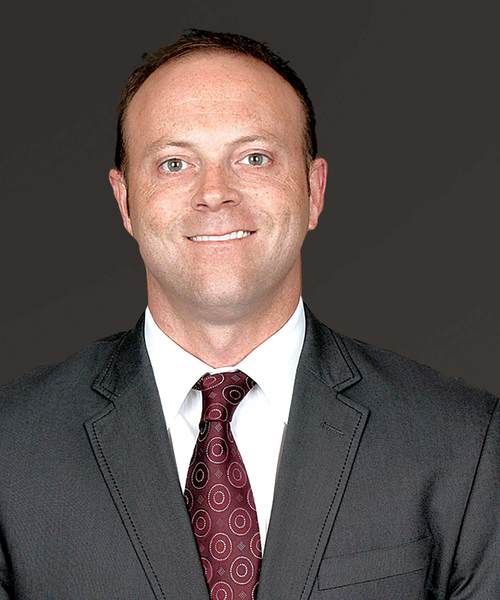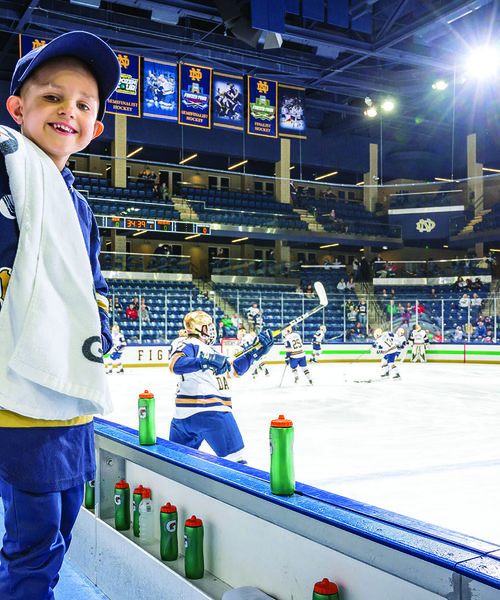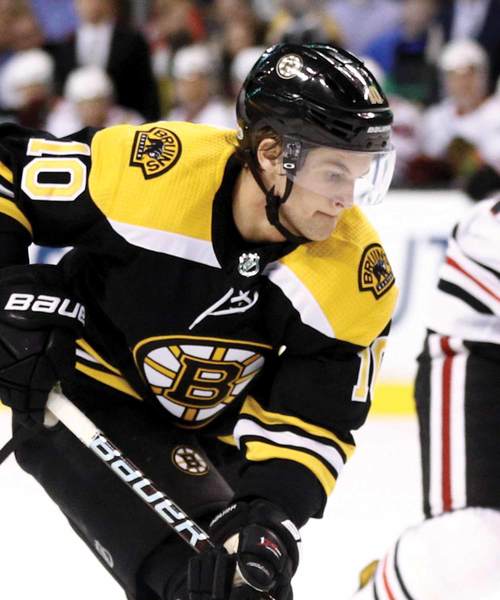
Stan Bowman
Building on South Bend experiences
Stan Bowman makes it a point to walk the university of Notre Dame campus whenever he returns for a visit.
“What a time I had there,” he says, reflecting on a period of transformation in his life. “I think I appreciate it more as an adult.”
Bowman, 42, is a graduate of Notre Dame’s Mendoza College of Business, a distinguished member of its Class of 1995. The Chicago Blackhawks have won three Stanley Cup championships during his six years as their general manager, transforming themselves from a National Hockey League eyesore into one of pro sports’ model franchises.
Bowman’s appreciation for what the team has achieved is heightened by a personal ordeal he endured just as the Hawks’ revival was taking shape. In 2007 he was diagnosed with Hodgkin lymphoma—cancer of the lymphatic system. He was a 33-year-old husband and father of two. For the better part of two years his life was a succession of chemotherapy and radiation treatments and, finally, a stem cell transplant before he was declared symptom-free in 2009.
“After the fact, you look back on it with different perspective,” Bowman says. “I was fortunate. Maybe it’s part of the human spirit that we find a way to get through things.”
Such enlightenment was part of the growing-up process Bowman experienced at Notre Dame, but it’s more than nostalgia that brings him back to campus.
The Blackhawks began the 2009–10 season with two games in Finland. They finished it by hoisting the Cup for the first time in 49 years, beating the Philadelphia Flyers in a taut six-game final series.
A labor dispute delayed the start of the 2012–13 season, and an ice show occupied their United Center rink when it finally got underway, so the Blackhawks played 10 of their first 12 games on the road. Five months later they hoisted the Cup again after besting the Boston Bruins in another tense six-gamer.
Credit, of course, goes to a roster rich in dynamic young talent that Bowman helped acquire. Coach Joel Quenneville mixed and matched that talent with unrivaled skill and imagination. But Bowman also sensed something from those two lengthy, season-opening trips: a bond developing. “The common denominator in our group was spending time together early in the year and creating an opportunity to jell,” he says.
So he sought to replicate that team-building experience before the 2013–14 season by taking the Hawks out of town for training camp. Notre Dame was close by, it offered a state-of-the-art facility in the Compton Family Ice Arena … and it was Notre Dame.
The Blackhawks lost a tough seven-game series to the Los Angeles Kings in the 2014 Western Conference finals. But in June 2015, when team captain Jonathan Toews and his mates affirmed their status as a dynasty by hoisting the Cup for a third time, a tradition was established. The Hawks were back at Notre Dame this September, a first step in their quest to become the NHL’s first repeat champions since the Detroit Red Wings in 1997 and 1998.
Ever the considerate guests, the Hawks sought to share some championship mojo with their hosts by bringing the Cup to Notre Dame Stadium on Sept. 19, joining the 80,795 spectators who watched the Irish put a 30-22 whipping on favored Georgia Tech.
“It’s worked out pretty well for us,” Bowman says with characteristic understatement.
He’s at ease in an unpretentious United Center office. The decor reveals a family man, a hockey man and a Notre Dame man. His expression in conversation suggests awareness, inquisitiveness and quiet pride. Notre Dame is part of Stan Bowman. A big part.
He neither looks nor acts like hockey royalty, but Stan Bowman comes as close to it as there is.
He is named for the Stanley Cup, for starters.
“My mom was pregnant with me in the spring of 1973, and my dad was coaching the Canadiens,” he recalls. “They decided during the playoffs that if she had a boy … ”
Stanley Glenn Bowman—his middle name is an homage to Hall of Fame goaltender Glenn Hall—entered the world on June 28, 1973, a month after the Canadiens won the first of five Cups they would win with Scotty Bowman as their coach. Stan has two brothers and two sisters and is the third oldest of Scotty and Suella Bowman’s five children. His dad would win another Cup with the Pittsburgh Penguins and a total of five with the Detroit Red Wings—three as coach and two as a front-office executive.
Scotty Bowman was an NHL head coach for 30 years, with additional stops in St. Louis and Buffalo, which Stan considers home. He made 29 playoff appearances and finished with the most regular-season (1,244) and playoff wins (223) in hockey history. Between them, Scotty and Stan Bowman lay claim to 14 Stanley Cups, “which is probably some sort of record,” Stan says modestly.
Hockey royalty indeed, though young Stan was not too regal to take a job at Wegman’s Supermarket in suburban Buffalo. He advanced from cart wrangler to grocery manager working summers and on vacation breaks from Notre Dame.
“You learn to be dependable and responsible and how to get along with people in a job like that,” Stan says.
If he never saw grocery stores as his long-term future, neither did he feel pressure to follow his father into the family business. He quit the hockey team at Buffalo’s Canisius Prep as a high school sophomore because an overbearing coach was squeezing the fun out of the game.
“I thought my dad would be mad,” Stan says, “but he would never force me to play if I wasn’t enjoying it. He usually left me to figure things out on my own.”
As it does with many youngsters, Stan’s path to Notre Dame originated with a trip he took to visit a friend’s older brother on a football weekend. He’s a low-key guy by nature, but he wanted in on the excitement he witnessed, as well as a first-rate education.
“It just had the feeling of a special place,” Stan recalls.
Fellow students from the cities where his dad had coached might have recognized his name, but Stan enjoyed a fairly anonymous existence as a Keenan Hall resident, taking in all that Notre Dame had to offer, including some time with the golf team as a walk-on.
“The question I heard most from people who made the connection was, ‘Why aren’t you playing hockey?’” Stan recalls. “I was. I played club hockey, intramural hockey and in a men’s league in South Bend. I was a pretty good player at those levels, but I wasn’t good enough for the varsity, even though we weren’t especially good back then.”
In many ways, his was a typical Notre Dame undergrad existence.
“I wasn’t necessarily the smartest guy, but I knew how to get good grades,” Stan says. “I went to class, I took notes, I asked questions, I had some great professors. So when exam time came,
I didn’t need to panic or freak out.”
That eagerness to learn, along with a thoughtful, analytical approach to doing so, has served Stan well throughout his life.
As Scotty Bowman’s Pittsburgh Penguins were sweeping the Blackhawks in the 1992 Stanley Cup finals, Stan traveled to Chicago for the final two games. The experience made an impression. On the drive back to campus, he told his mother he was thinking about a career in hockey, but he took his time making the commitment, After graduating from Notre Dame with a double major in finance and computer applications, he moved to Chicago and spent six years in private business. He also met Sue, who became his wife in 1999. They have 13- and 10-year-old sons, Will and Camden, and a 4-year-old daughter, Graycen.
“I did consulting with Arthur Andersen and a firm called Benchmark Solutions,” Stan says. “I traveled quite a bit, and it was a good job to have in my twenties, but I didn’t see myself doing it in my forties.”
Not when hockey had begun exerting a stronger pull. Scotty Bowman had moved on to Detroit to oversee a Red Wings dynasty, and a word from the NHL’s godfather could have got Stan in the door with any team. On his own, he approached the Blackhawks and was hired in 2000 to work on the business side, “analyzing budgets, that sort of thing.”
General manager Mike Smith eventually brought him over to hockey operations.
Not that working for the Blackhawks carried much cachet in Chicago. The on-ice product was abysmal—one playoff appearance and one first-round exit over one 12-year period—and some of chairman Bill Wirtz’s business practices (home games were not televised) alienated a dwindling fan base.
“It was a tough time for the franchise,” Stan says, “but a good time for me. I had opportunities to learn and do a lot of different things.”
If Smith and successor Dale Tallon were betting on bloodlines, they weren’t disappointed as Stan advanced from hockey operations aide to assistant general manager. Hockey conversations had been a near constant in the Bowman household, and Stan was an eager listener.
“Scouting was a lot less sophisticated then,” he recalls. “There was no Internet, not as much video. A coach learned about players by talking to people—scouts, assistant coaches. My dad was always talking hockey, and I listened in whenever I could. I think I developed a pretty good sense of what makes a good player and what to look for in putting a team together.”
But the challenge of restoring the Blackhawks paled in comparison with the challenge Stan faced in his personal life. In 2007, swelling in his lymph nodes prompted a visit to the doctor. The diagnosis of Hodgkin lymphoma was grim and scary. Stan approached those months of radiation and chemotherapy with characteristic resolve, determined to present a brave, normal front for his family.
“My boys were 5 and 2 at the time, and it would not have been good for them if their dad was anything less than their dad to them,” he says. “If I had been nervous, they’d have been nervous. I approached it like, ‘OK, you got sick. Now what do you have to do to get better?’”
Not long after Stan completed his chemo/radiation regimen, the cancer recurred. In 2008, he underwent a stem cell transplant at University of Chicago Medical Center, requiring a lengthy hospital stay. Again, he sought to shield his family from his own trauma.
“When they came to visit, they couldn’t come up to my room for precautionary reasons, so I’d come down to them,” Stan recalls. “There was this little visiting area by the lobby where we’d go. When we brought the Cup to the hospital this year, I asked the boys if they remembered it. The older one (Will) said he barely did, and the younger one (Camden) had no memory at all.”
The transplant took, and Stan has been cancer-free since 2009. “No meds, no special diet … it’s a pretty normal existence,” he says.
Stan recalls heart-to-heart talks with a volunteer from a group called Imerman Angels. The sessions helped him maintain his emotional equilibrium during his treatments.
“Imerman Angels pairs you with someone who has been through what you’re going through, someone around your age, your gender, your same type of cancer,” he says. “Those conversations were really helpful in terms of knowing what to expect. You come to understand that you’re not alone in this.”
Stan was so grateful for the moral support that he became an Imerman Angel volunteer himself after his treatments. In addition to counseling other cancer patients, he serves on the organization’s board of directors and is an enthusiastic fundraiser, bringing the Stanley Cup to a Chicago night spot in late October for a benefit function.
He’s also extensively involved with Blackhawk Charities, which contributes millions of dollars each year to various Chicago-area causes.
Stan was on his way back to full health when the arc of his career was altered substantially: In 2009 the Hawks offered him the general manager’s job following Tallon’s resignation. At 36, he was the youngest general manager in hockey, but he felt he was up for the challenge. “I was confident, prepared,” he says.
He has always been proud of being Scotty Bowman’s son, but Stan earned this opportunity on merit.
“Stan is brilliant,” says Hawks president John McDonough, who offered him the promotion with chairman Rocky Wirtz’s blessing. “He’s thorough, he’s measured, he’s always prepared, he’s decisive. He talks to people and seeks their input, but when the time comes, he’s not afraid to make a decision and move on it.”
Stan Bowman’s job can be both enormously gratifying and occasionally thankless, sometimes within the same month. Pro sports is big business, and players expect to be paid big dollars when a team wins championships and packs the house the way the Blackhawks have. But the NHL’s salary cap is an unforgiving beast. Managing it has forced Stan into making and taking heat for cap-mandated roster moves that were as controversial as they were necessary. Dustin Byfuglien, Andrew Ladd, Antti Niemi, Dave Bolland, Patrick Sharp, Brandon Saad and Kris Versteeg were all popular, productive Blackhawks. And they were all salary-cap casualties. That the Hawks have been able to retool and roll on speaks to Stan Bowman’s savvy and skill as an administrator.
“I have to make decisions based on what’s best for the organization,” he says. “In this job, you have to make a lot of decisions where emotions can’t interfere. I don’t get too close to the players because I can’t get paralyzed by emotion when it’s time to make those decisions.”
His stoicism extends to watching games; Stan’s expression rarely changed and he betrayed no emotion as the Blackhawks and Anaheim Ducks went at each other with playoff-like intensity during a late October game at the United Center. The Hawks finally won, 1-0 in overtime.
“My kids are really into it, and they give me a hard time because I don’t cheer,” he says. “I’ve always been like that when I watch. More analytical than excited.”
It’s a trait he inherited from his father, who is readily available for consultation. Scotty Bowman, now 83, serves the Blackhawks as a senior adviser, with considerable input.
“I always thought it would be great to work for the same team with my dad,” Stan says.
The idea may well have germinated as his life’s course was being plotted at Notre Dame.
“Beyond academics and athletics, that was the perfect environment for me to grow as a person,” Stan says. “You’re learning how to navigate the world as an adult. What does it take to be a good person, a good friend, a good family man? Notre Dame was where all that sort of took hold. I was able to figure out what’s really important to me. I don’t know if it was a magical transformation, but those experiences will be with me the rest of my life.”

